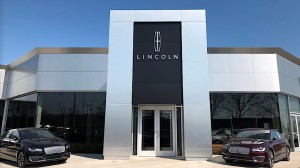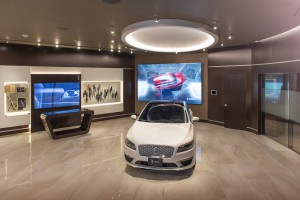
Lincoln is pushing dealers with twin Ford-Lincoln dealerships to split those locations up, creating standalone stores, like Lincoln of Troy (Michigan).
Lincoln is the latest luxury brand looking to exploit the advantages of this trend: stand-alone dealerships.
After escaping death at the hands of former Ford CEO Alan Mulally nearly five years ago, the company is asking owners of Ford-Lincoln dealerships in 30 major markets to build separate stores for the Lincoln brand.
The concept isn’t entirely new as plenty of automakers have asked dealers to do the same throughout the years, the most recent being Hyundai and Genesis, although that program is in its infancy. Lincoln has a bit of history with stores separate from Ford-branded outlets from the days when it was Lincoln-Mercury.
In the past, many dealers have resisted such moves because the move isn’t cheap; however, Ford data shows there’s plenty of financial incentive to set up a new shop.
(Lincoln hopes to take wing with new Aviator SUV. Click Here for the story.)
Lincoln’s standalone dealerships in the top 30 U.S. markets that account for 70% of luxury segment sales, saw that their sales increased 48% from 2014 to 2017, compared to an overall Lincoln brand sales increase of 18%.
After a former Ford-Lincoln dealer in Minneapolis opened a devoted Lincoln store this January, sales have climbed 60% while dealers in California and Georgia have seen 50% jumps since the standalone units have opened., according to Automotive News. The sales manager at the Atlanta, Georgia, dealer said, “Customers have pulled up and said, ‘This is how it should be.'”
“Customers expect the environment to be equal to the product. They want to buy a luxury product in a luxury environment,” said Robert Parker, Lincoln’s head of marketing.
(Click Here for more about Lincoln’s upgrades and refreshes MKC for 2019.)
Currently, Lincoln has 845 dealers across the U.S. and 150 of those are in the top 30 markets. Just under 50% of those are making the move to standalone stores, according to Automotive News. Lincoln wants the remaining 78 dealers to do the same, signing on the dotted line by July 2019 with stores open two years later.

Ford Motor Co. is giving Lincoln dealers in its top 30 markets until Q2 2021 to set up independent Lincoln stores.
To take some of the sting out of it, Lincoln is providing some incentives for relocation as well as paying more for each Lincoln sold. Additionally, it’s only the sales portion of the business that needs to be standalone. Service and back of the house departments can remain as one unit.
However, the brand does mean business about splitting from Ford stores: after Q2 2019, Lincoln won’t let twinned dealers sell Black Label trims if they don’t already, AN reported. The company is in the midst of a product renaissance that should bring new customers to Lincoln. That expanded and updated line-up is critical to the brand’s long-term success.
(To see more about Lincoln upping its star power with Serena Williams, Click Here.)
“The next phase of the transformation is critical. This is probably the biggest two years in Lincoln’s history,” Parker said.

